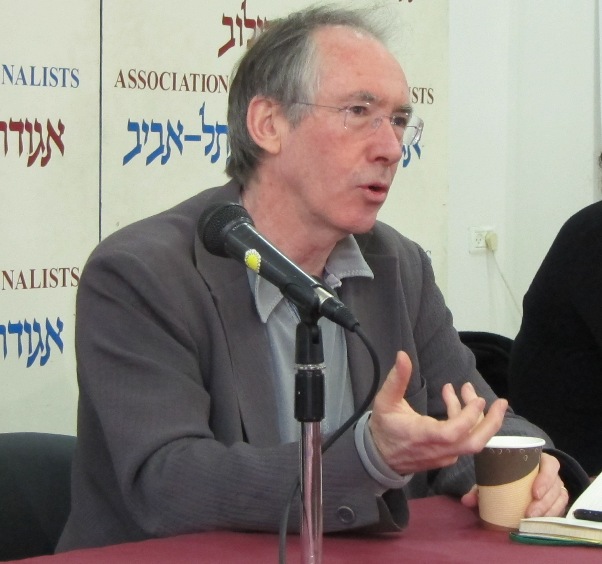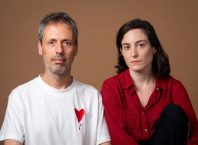
Amidst the literary excitement and political hue and cry surrounding Ian McEwan’s arrival in Israel to accept the Jerusalem Prize, the author participated in a press conference held yesterday, February 18, 2011 in Tel Aviv. Surrounded by cameras and questions, McEwan responded with warmth and humor, revealing the same acute awareness of his surroundings, sensitivity of perception, and attention to detail that can be found in his novels.
Of his presence in Israel, McEwan said, “I am very conscious of being in a country with a true democracy,” noting that the Israeli newspapers display “an extraordinary range of opinion” and that while he does not “endorse every tenor of domestic and foreign policy, nor do its citizens.” While he does not necessarily agree with every aspect of Israeli policy, McEwan chooses not to employ boycotts as a means of expressing his political opnions but rather emphasized the need to “engage and keep speaking.” Referring to those who support boycotts on Israel, he said, “I disagree, I’d rather engage. On some matters I share their opinions but what one does about it…are you going to stop settlements being built by staying away? No.”
Literature forms part of the cultural dialogue between people and countries, and McEwan has more than a passing acquaintance with Israeli literature. Referring to A. B. Yehoshua, David Grossman and Amos Oz as writers who “have made a huge impact around the world” he spoke in greater detail of his recent experience reading S. Yizhar’s Khirbet Khiza’a (Ibis Editions 2008, English translation by Nicholas de Lange and Yaacob Dweck) as “hallucinogenic kind of prose describing the clearing of an Arab village in the ’48 war, and this book was required reading for Israeli schoolchildren for many years. It’s extraordinary, not many countries would incorporate something so profoundly disturbing and critical into schoolbooks.” [although Khirbet Khiza’a was part of the curriculum during this writer’s high school years, to the best of my knowledge it is not currently part of the school curriculum]
When as if he considered the Jerusalem Prize as a valedictory on his writing career, McEwan said, “God, I hope not valedictory, especially since I’m halfway through a novel. No, I feel like Mrs. Thatcher, I’ll go on and on and on…It’s always a problem for writers. There has to come a point in any writer’s life when he or she senses or even denies that they’ve written their best work, their best work is behind them. There is a long slow decline, unless it’s is a sudden one. I’ve got a feeling that in my decline I can write novellas, when I can’t write novellas anymore I’ll write short stories, and then I’ll settle for Haiku.”
Although politics are always part of the conversation in Israel, literature was not neglected. Responding to a question about relevance for the world at large, McEwan said, “I think the novel is a regional form, the novel at its best is deeply provincial any writer writes out of a sense of his or her place. In my own case anyway when the novel moved away from that and tried to be purely existential, setting novels in unnamed cities in unnamed points in history, it becomes less interesting to me. I think the challenge is to grasp what it is to be a man or woman in the 21st century – what it’s like being in that situation.”
When asked what the term “McEwanesque” might mean to literary scholars in another 50 years, McEwan said, “It used to mean horribly macabre – psychotic individuals doing deranged things. It’s taken me quite sometime to live that down. I tend to regard each novel as my first and I try to make space between novels in order to leave the last one behind. So what I am doing now is very remote from my last novel Solar. I try to keep a sense of the panic as well as freshness of writing for the first time,” adding “writers do have a way of vanishing just below the cultural horizon when they die. To be read at all in 50 years time will be an achievement. It’s not an achievement I expect to be aware of – I don’t hold much hope for the afterlife.”
Yet the author displayed a tender affection for his works, especially in the discussion of their film adaptations. McEwan said, “I’ve been lucky to have serious attempts rather than cynical attempts,” saying that he particularly liked The Cement Garden, and the casting of Kiera Knightly in Atonement. Expressing some lingering feelings for ‘the one that got away’ McEwan said of the one film that did not work out well, The Innocent, “I still think that film could be rescued if we cut and edited…I must have done more drafts of that screenplay than I’ve had hot dinners…after that I thought: I’ll never do another screenplay of my own work, but then I forgot.”
He is currently working on a new book, one that he refers to as “something historical, meaning 1972, I don’t really want to talk about it.” In speaking of the novel, McEwan refered to writers such as Jane Austen, Gustave Flaubert and Leo Tolstoy, when asked whether he feels that in his writing there is a dialogue with other writers, he said, “The furniture of my mind is arranged around other writers in a way, dead writers mostly, and I think a literary creation is an kind of extended conversation and it’s inevitable… They’re always there, breathing down your neck. The writers most likely to influence you are the ones you’ve never read.”
McEwan seems inclined to make use of this visit to engage – travelling as much as time allows (including a visit to the West Bank), meeting with David Grossman, and expressing his opinions on the issues. When the issue of the recent dramatic events in Egypt came up, McEwan said, “I spent hours in front of my TV set, watching the Egyptian revolution. Are we calling it a revolution with the army still in charge? I was exhilarated… it’s strange to be reminded of the social contract, how people are still bold enough to come together, so I was thrilled by it. We don’t know entirely where this will lead…crowds aren’t usually wise, but their restraint under pressure seems to be heroic. We’re also witnessing a youth revolution too.”
“My first thought on this, and I know there’s been a lot of discussion here, I hope that Israel welcomes the spread of democracy rather than be too stressed. I know your Prime Minister [Benjamin Netanyahu] said – hope for the best, prepare for the worst, and I know that’s very practical but hope for best may not be quite emphatic enough. Maybe one should be agitating for the best, pressing forward for the best. Many revolutions lead precisely in the opposite direction than that intended… we all remember Iran…for every moment of exhilaration in the streets there’s a Robespierre waiting.”






Comments are closed.